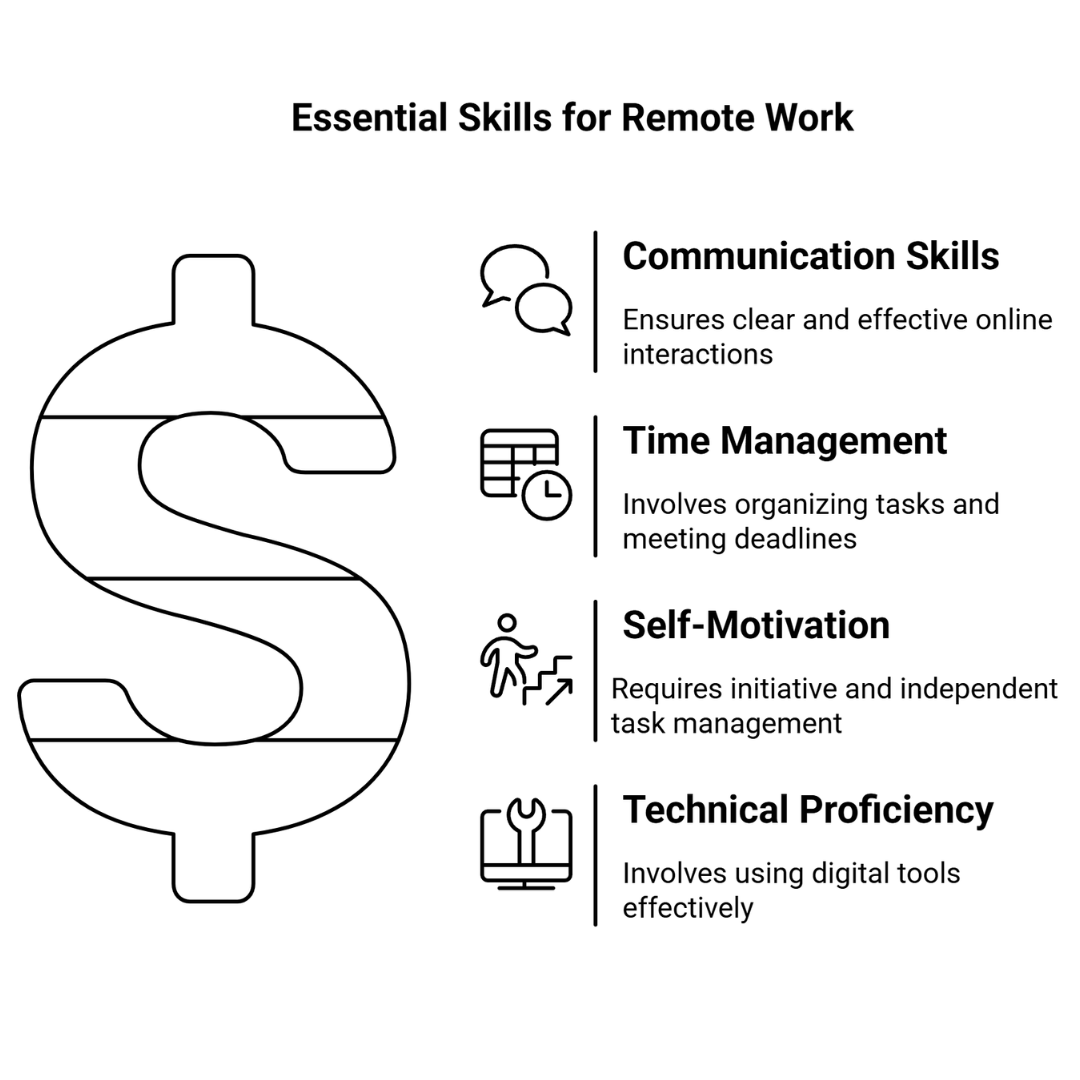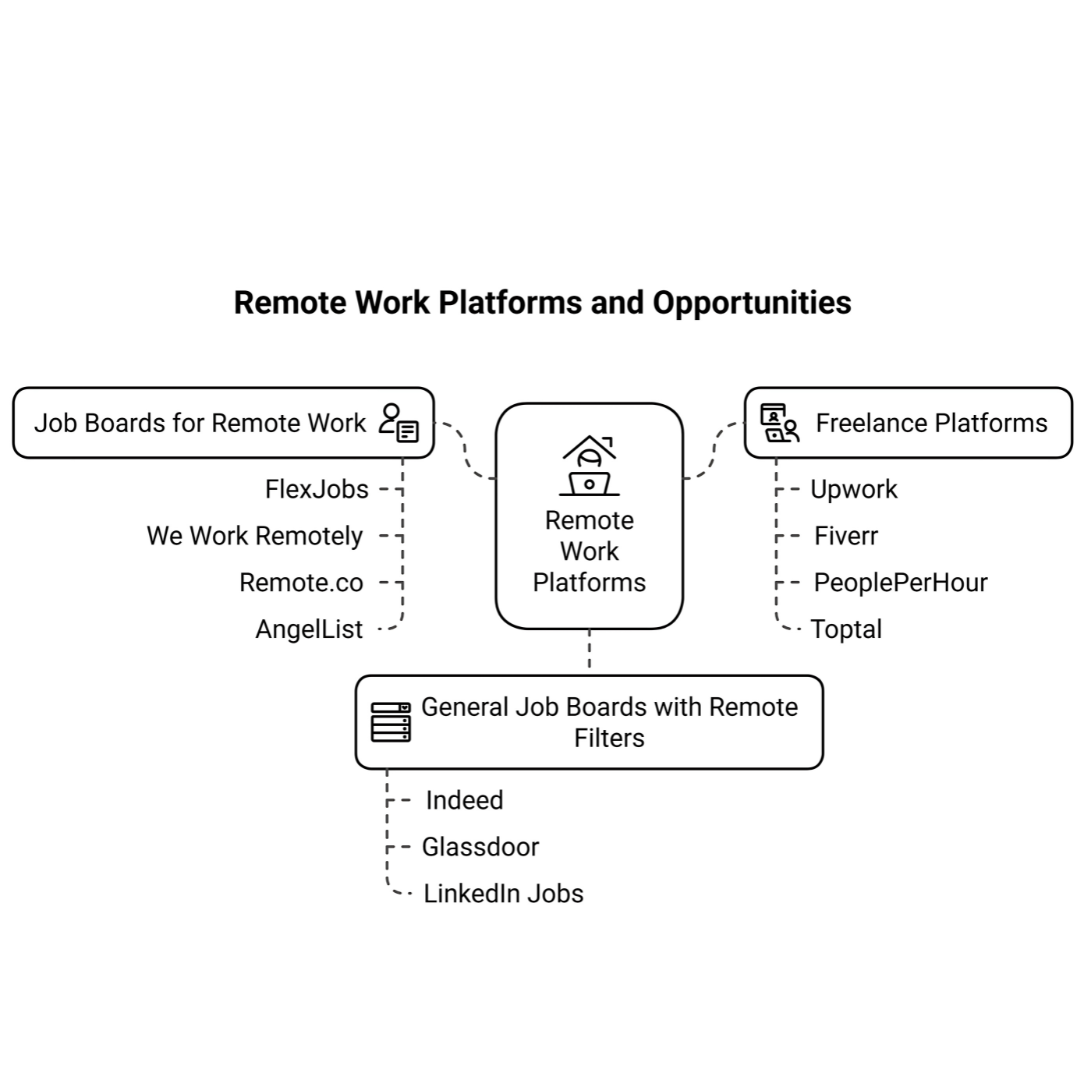How To Find A Home Job
How To Find A Home Job
The growth of the digital economy has made home-based jobs more accessible than ever. Whether looking for a full-time remote position or a side hustle, working from home provides flexibility and the chance to attain a better work- life balance.
Our tips on how to find a home job will guide you through the process of remote work, including where to look, how to prepare, and how to succeed in a remote work environment.

Types Of Home Jobs
Before starting your job search, it is essential to understand the different types of home jobs available:
1. Virtual Assistance
The virtual assistant sector is expected to expand by 31% from 2020 to 2030, with VAs earning between $20-$30 per hour and top professionals making over $60,000 annually.
Begin by familiarizing yourself with administrative tools like Microsoft Office and Google Workspace and project management software such as Trello or Asana. Then, build a profile on Upwork, Fiverr, or LinkedIn and apply for VA jobs that match your skills.
2. Online Tutoring And Teaching
The e-learning industry is projected to reach $375 billion by 2026, with tutors earning between $15-$50 per hour. Platforms like Udemy serve over 62 million students.
Are You Tired Of Scams?
Want to Start Making Money Online?
To begin, choose a subject you excel in, sign up on VIPKid, Chegg, or Teachable, and create a profile showcasing your expertise. Recording sample lessons and promoting your services on social media can help attract students.
3. Customer Service And Support
Remote customer service roles are expected to grow by 10% over the next decade, with an average salary of $35,000 per year. Around 60% of positions offer flexible part-time options.
To start, I need to gain experience in customer support, improve my communication skills, and learn CRM software like Zendesk or Salesforce. Apply for remote customer service roles on job sites such as Indeed, LiveOps, or Working Solutions.
4. Social Media Management
Businesses spend approximately $65 billion annually on social media marketing, and social media managers earn between $50,000-$80,000 per year.
Freelancers in this field can charge $25-$100 per hour. To get started, take online courses on social media marketing through HubSpot or Coursera. Manage small business accounts to build a portfolio and offer services on Upwork or Fiverr.
5. E-Commerce And Dropshipping
The global e-commerce market is valued at $5.5 trillion, and dropshipping accounts for 23% of online sales. Profitable sellers make between $1,000 and $5,000 per month.
To start, choose a niche, create an online store using Shopify or Etsy, and source products from AliExpress or Printify. Leverage SEO, paid advertising, and social media marketing to boost traffic and enhance sales.
6. Freelance Writing And Editing
The freelance writing market is worth $1.2 billion, with writers earning $30-$100 per article and editors making $40-$80 per hour.
To begin, select a niche such as tech, health, or finance, and build a portfolio using platforms like Medium or Contently. Pitch article ideas to blogs and businesses, and find gigs on freelance marketplaces such as Upwork, Freelancer, or ProBlogger.
Want to Start Making Money Online?
Try My #1 Recommendation Program!
7. Affiliate Marketing
Affiliate marketing is a $17 billion sector, with 80% of brands using affiliates and top earners making six figures annually. To start, choose a niche and sign up for affiliate programs like Amazon Associates or ShareASale.
Set up a blog, YouTube channel, or social media profile page to promote affiliate products using referral links, and focus on SEO and content marketing to drive traffic.
8. Online Coaching And Consulting
The online coaching market is valued at $20 billion, with most coaches earning between $50,000-$100,000 annually. To begin, choose a specialty such as business, fitness, or career coaching, and obtain certification if needed (e.g., ICF for life coaching).
Offer free sessions to build credibility, collect testimonials, and market your services through a personal website and social media.
9. Handmade And Craft Selling
The handmade goods market generates approximately $100 billion annually, with Etsy hosting 7.5 million sellers worldwide.
Want to Find Out How To Start Your Home-Based Business?
Try My #1 Recommendation Platform!
Choose a craft such as jewelry, candles, or artwork, and set up an online store on platforms like Etsy or Shopify. High-quality product photos, engaging product descriptions, and marketing through Instagram and Pinterest can help attract customers and drive sales.
10. Website And App Development
The software development industry is projected to grow by 22% by 2030, with freelance developers earning $75,000-$150,000 annually.
To start, learn coding languages such as HTML, CSS, JavaScript, Python, or Swift. Build a portfolio by creating small projects and contributing to open-source work. Find freelance clients through LinkedIn, GitHub, or platforms like Upwork and Toptal.

How To Find A Home Job
This in-depth guide will take you through the journey of landing a home-based job, from researching opportunities to preparing your application and thriving in a remote work environment.
1. Identify Your Skills And Interests
Evaluate your skills and interests before seeking a remote job. Identify strengths and passions that employers value in candidates.
Communication Skills
Clear communication is crucial for remote work, as most interactions are online. Being able to express ideas clearly, actively listen, and collaborate through emails, video calls, and messaging platforms ensures smooth workflows and minimizes misunderstandings, boosting overall productivity.
Time Management
Remote work demands strong time management to stay organized and meet deadlines. Setting clear priorities, creating schedules, and avoiding distractions are key strategies for ensuring efficient task completion without compromising quality, leading to sustained productivity in a home-based environment.
Self-Motivation
Self-motivation is crucial in remote work due to the absence of direct supervision. Taking initiative, setting personal goals, and managing tasks independently ensures focus and consistently high-quality work. This ability helps maintain productivity and accountability without constant guidance.
Technical Proficiency
Remote jobs often require technical tools for communication, project management, and file sharing. Familiarity with platforms like Zoom, Slack, and Google Workspace helps maintain smooth workflows, resolve technical issues quickly, and ensures that remote work runs efficiently and effectively.

2. Build A Strong Resume And Online Presence
A strong online presence is crucial since you will be applying for jobs remotely. Here are some key steps:
Update Your Resume And Cover Letter
Modify your resume and cover letter to demonstrate your experience with remote work, excellent communication skills, and flexibility.
Highlight relevant achievements and showcase your ability to work independently and organize tasks effectively in a remote environment.
Create A LinkedIn Profile
Build a strong LinkedIn profile by engaging with industry professionals and showcasing your expertise. Highlight your remote work experience, skills, knowledge and endorsements to improve visibility, expand your network, and attract potential employers seeking remote workers.
Develop A Portfolio
Develop a portfolio website for creative and freelance roles to showcase your work samples. Blend multiple projects that showcase your proficiency, creativity, and accomplishments, giving potential employers a clear view of your capabilities and style.
Engage In Online Communities
Join online forums, groups, or social media communities related to your industry. Actively participating in discussions, sharing insights, and networking allow you to remain informed about job openings and establish yourself as an expert in your field.
3. Search For Home Job Opportunities
Here is a list of platforms where you can find remote work.
Job Boards For Remote Work
FlexJobs
FlexJobs offers curated remote job listings across full-time, part-time, freelance, and contract positions. It ensures scam-free opportunities with detailed search filters. However, a subscription is required. Income potential ranges from $30k to $100k+ annually, depending on the role.
We Work Remotely
We Work Remotely provides various remote job opportunities across multiple industries. It’s easy to use but offers less variety in niche fields. Job income generally ranges from $40k to $90k, especially in tech positions.
Remote.co
Remote.co offers remote job listings and resources for both job seekers and employers. It’s beneficial for those new to remote work. While executive roles are limited, income potential ranges from $40k to $120k+ annually for other positions.
AngelList
AngelList specializes in startup jobs, often offering equity compensation. It’s ideal for individuals seeking innovative roles, but due to equity, it comes with competition and potential financial instability. Salaries typically range from $50k to $150k, with equity as a bonus.
Freelance Platforms
Upwork
Upwork is a sizeable freelancing platform offering a variety of remote job categories. Freelancers can set their schedules but face competitive bidding and platform fees. Income typically ranges from $20 to $100+ per hour based on expertise and job type.
Fiverr
Fiverr allows freelancers to offer specialized services or microtasks with low entry barriers, ideal for beginners. However, it’s highly competitive, and platform fees can reduce earnings. Income ranges from $5 to $500+ per project, depending on the service offered.
PeoplePerHour
PeoplePerHour offers hourly freelance jobs in a broad range of job categories. Its platform is easy to use but has high service fees and competitive bidding. Based on skills, freelancers typically earn between $20 and $75 per hour.
Toptal
Toptal connects experienced freelancers with high-quality clients in software development and finance. The strict screening process ensures exclusivity, but joining can be difficult. Freelancers earn $50 to $200+ per hour, depending on expertise and client demand.
General Job Boards With Remote Filters
Indeed
Indeed is a general job board with extensive remote job listings across multiple industries. While it offers a large variety, the quality of remote jobs can vary. Income potential ranges from $30k to $100k+ annually, depending on the role and company.
Glassdoor
Glassdoor provides company reviews, salary insights, and remote job listings. Its transparency offers valuable information, but the volume of listings can feel overwhelming. Income potential ranges from $40k to $120k+, depending on the position, industry, and company.
LinkedIn Jobs
LinkedIn Jobs is a professional networking platform that provides remote job postings and networking opportunities. It’s great for job connections but sometimes includes spammy job offers. Income potential ranges from $50k to $120k+ annually, depending on the role and experience.

4. Apply Effectively
When you find the right job openings, apply strategically by customizing your application and following instructions carefully to stand out.
Customize Your Applications
Modify and personalize your resume and cover letter for every job application. Highlight relevant skills, experiences, and qualifications that match the job description. Personalizing your application shows the employer that you’ve taken the time to understand the role.
Follow Instructions Carefully
Employers often include specific instructions in job listings to help identify serious candidates. Carefully read the job posting and ensure that you follow all instructions, such as submitting documents in the correct format or including requested details.
Network With Industry Professionals
Engage with professionals in your field on LinkedIn or industry-specific forums. Developing relationships helps expand your knowledge about job opportunities, gain insights, and make connections that could increase your chances of being considered for a remote position.
Be Persistent and Follow Up
After applying, don’t hesitate to follow up on your application. A polite, professional email to check the status shows interest and initiative. Persistence can always help keep you top-of-mind with potential employers.
5. Prepare For Remote Job Interviews
Remote job interviews are typically held through video calls. Follow these tips to ensure that you're well-prepared and confident.
Test Your Equipment
Before the interview, ensure your internet connection, webcam, and microphone are working properly. Check them beforehand to prevent technical difficulties that could disrupt the interview and affect your professionalism.
Choose A Professional Background
Select a quiet, well-lit area for your interview. It should also be free from distractions. A clean and organized background presents a professional image and helps you stay focused during the conversation.
Practice Common Interview Questions
Practice common interview questions by preparing to discuss your experience, problem-solving abilities, and how you handle challenges in remote work. This will help you feel more confident and articulate during the interview process.
Showcase Your Remote Work Skills
Emphasize your capacity to work independently, stay organized, and meet deadlines. Highlighting these skills in the interview demonstrates your readiness to succeed in a remote work environment and reassures employers of your reliability.

6. Avoid Work-From-Home Scams
Remote job scams are very common. Here’s how to spot and avoid fraudulent opportunities to protect yourself and your career.
Be Wary Of Upfront Fees
Legitimate employers will never request compensation to apply for a job or start working. Be cautious of companies that require fees upfront, as this is often a sign of a scam.
Research The Company
Before applying, thoroughly research the company by checking reviews on platforms like Glassdoor, Trustpilot, and LinkedIn. This will help you verify its legitimacy and give you insight into the experiences of current or past employees.
Are You Tired Of Scams?
Want to Start Making Money Online?
Watch For Unrealistic Promises
Be cautious of job offers that promise unusually high income with minimal effort. These unrealistic claims are often red flags for scams or deceptive business practices, and it's important to stay skeptical of such promises.
Verify Email Domains
Always check the email domain of any company that contacts you. Legitimate companies typically use professional, branded email addresses rather than generic ones like Gmail or Yahoo, which scammers commonly use.
7. Enhance Your Productivity While Working From Home
Maintaining productivity in a home job can be difficult, but the proper techniques will help you succeed. These tips will boost your efficiency:
Set a Dedicated Workspace
Design a comfortable, organized workspace that reduces distractions and promotes focus. Separating work from personal space will create a productive environment that enhances concentration and helps maintain a precise work-life balance.
Follow A Routine
Create a daily schedule with designated work hours. This will boost productivity and help you stay focused, ensuring long-term success in remote work.
Use Productivity Tools
Tools like Trello, Asana, and Slack are ideal for managing tasks, collaborating with teams, and communicating effectively. They help you stay organized, keep projects on track, and ensure the timely completion of work while working remotely.
Take Breaks
Regular short breaks during the day help sustain focus, alleviate stress, and enhance productivity. These pauses prevent mental fatigue, reduce the risk of burnout, and ensure you stay refreshed throughout long work hours.
8. Consider Additional Income Streams
If you're looking to supplement your income, there are multiple ways to earn money from home. Explore these options for extra cash:
Want To Learn How To Create Your Own Website And Online Business?
Try My #1 Recommendation Training And Hosting Platform!
Affiliate Marketing
Share unique referral links to promote products or services. You receive commissions on every transaction completed through your links, allowing you to generate a consistent income stream while working from home with minimal investment.
Online Tutoring
Share your expertise in subjects like math, languages, or music through online tutoring platforms. These platforms connect you with students, providing flexible hours and an enriching, rewarding experience as you help others learn.
Dropshipping
Launch an online store without handling inventory. Work with suppliers to sell products straight to customers, earning profits from the difference between the retail price and the wholesale cost, while avoiding upfront investment in stock.
Blogging And YouTube
Share your knowledge, passions, or experiences through blogs or YouTube videos. Ads, sponsorships, and affiliate marketing can turn your content into revenue, transforming your creativity into a stable and trustworthy income source.
Conclusion
This concludes our guide on how to find a home job. By identifying your skills, leveraging online job platforms, applying strategically, and staying productive, you can successfully transition to working from home.
As the job market changes, remote work opportunities will only increase, providing greater flexibility and career growth possibilities. Begin your journey now and reap the rewards of working from home!
I trust you enjoyed this article about How To Find A Home Job. Please stay tuned for more articles. Take care!
JeannetteZ
Want to Learn How to Build Your Own Home-Based Online Business And Start Making Money Online From Your Comfortable Couch?
Try Wealthy Affiliate!
Your Opinion Is Important To Me
Do you have thoughts, ideas, or questions? I would love to hear from you. Please leave me your questions, experiences, remarks, and suggestions about How To Find A Home Job in the comments below. You can also email me at Jeannette@WorkFromAnywhereInTheWorld.com.
Disclosure
This post may contain affiliate links. I earn from qualifying purchases as an Amazon Associate and through other affiliate programs. Please read my full affiliate disclosure.
You may also enjoy the following articles:
Wealthy Affiliate Coupons For Premium Memberships
Wealthy Affiliate Review – Scam or Legit? The Truth Exposed
An Insider Wealthy Affiliate Review







